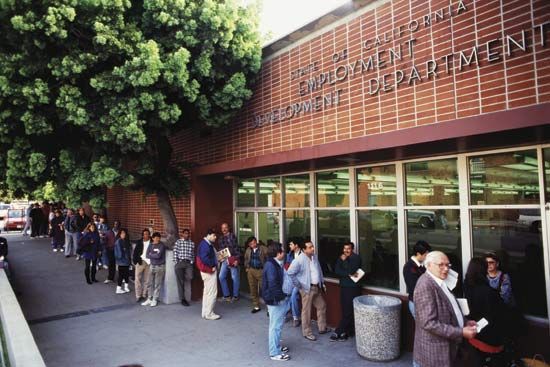
I have been very much enjoying my
dialog with arcturus. I remain unconvinced that Booman was trafficking in racist subtext in his
unfortunate diary. But I do think his analysis was shallow and a little ignorant.
Sometime in early 1992 I was driving alone from Los Angeles to see some friends and celebrate Mardi Gras in New Orleans. I remember a particular stretch of Interstate 10 as I passed down from the mountains of Las Cruces into the river valley of El Paso. Off to my right, on the far side of the Rio Grande, stood Ciudad Juarez. It made for a sorry cityscape, with acres and acres of dilapidated housing. By contrast, El Paso was positively sparkling. I wondered to myself how two cities...two cities so far from anywhere, could be so different from each other. And it occurred to me that the answers lay in Mexico City and Washington DC...in the Constitution and rule of law on the one hand and incompetence and corruption on the other. In our system of government nothing is more important than the separation of powers represented by the three branches of government: executive, legislative, and judiciary.
If we lose those checks and balances it will only be a matter of time before we lose everything. There will be nothing to distinguish El Paso from Cuidad Juarez. Our country will lose its unique characteristics that have made it so successful.
One thing Booman ignores is that we had a system of checks and balances long before we had the wealth distribution and social safety nets that kept poverty low and maintained our infrastructure. Our Constitutional Democracy, alone, is not enough to prevent the hemorrhaging of the middle class. Booman, like myself, grew up in the era of middle class America. We missed things like the gilded age and the great depression. It's hard to imagine an America where people live in poverty of the nature we see in Mexico. But to keep that from occurring will require more than the protection... nay, restoration, of our Constitutional process.
To wit fresh Krugman; and not behind the TimesSelect wall. Alternet has
published an excerpt from his keynote address conference on The Agenda for Shared Prosperity. Here are some juicy tidbits.
If you look back across the past 80 years or so of the United States, what you see is that in the 1920s, we were for practical purposes still in the gilded age. That may not be the way the historians cut it, but in terms of the actual distribution of income, so far as we can measure it in terms of the role of status and general feel of the society, we were still an extremely unequal royalist society.By the time World War II was over, we had become the middle-class society that the baby boomers in this audience grew up in. We had become a much more equal society. That high degree of equality began to go away -- depending on exactly which numbers you look at -- during the late 70's, maybe a little earlier than that. And at this point we're basically back to pre-tax and transfer to the levels of inequality that we had in 1929.
So there is this great arc to the middle class, away from gilded age to middle-class society and then back to the new gilded age, which is now what we're living in. And there are really two puzzles about that. One of them is a political puzzle, which is why instead of leaning against these trends, politics has actually reinforced them. Why it is that U.S. politics moved left in the age of a relatively middle-class society, and moved right as society got more unequal?
The impact of left/right politics:
Okay, I think that what we can say is that the political climate matters more for the distribution of income than the economic models that we know how to work with and would seem to suggest more than our models capture. If you ask me practically what I want done now, I think that the most important agenda thing right now is, in fact, to work on the taxes and social insurance side, because that is concrete and you can get stuff.
But there is a lot of reason to believe that a change in the political climate in various ways can do a lot more than you would think just from looking at the taxes and social insurance. Let me give you two pieces of evidence that I looked at. One is that there is some really interesting, though intellectually disturbing, work by my colleague, Larry Bartell who is in the Princeton Politics Department and has just looked at what happens to income growth at different points in the income distribution under administrations of the two parties.
Now there shouldn't be a big difference really because at any given historical period, the visible policies are not all that different. Certainly there is a pretty significant shift from Clinton to Bush and there was, in fact, a pretty significant shift from Bush to Clinton previously. But it's in taxes and it really shouldn't be very obvious at pre-tax distribution of income. And yet what Bartell finds is actually there is a really striking difference. Inequality on average rises under Republicans. At least in the bottom 80 percent of the income distribution, it's stable or falling under Democrats. The top 1 percent just kept on rising right through, but there is at least a surprising, fairly robust correlation.
The other thing I would say is timing. There's a very clear co-movement over time between income inequality and both the political polarization and the rightward tilt of our politics. It's pretty clear that the rising inequality over the past 30 years has been associated with a rightward shift of the political center of gravity, mainly because of the Republican Party shifting to the right.
You might say that's the causation running from income distribution to politics. But if you actually then just start to look at it through history, the timing actually seems to be reversed. The rise of an aggressive or rightwing movement and the rise of a really major assault on the New Deal great society legacy both come before the big shift in income distribution takes place.
And then, of course, there's the union busting.
Obviously, private sector unions were very important in the U.S. 30 years ago and have very nearly -- not completely, but very nearly -- collapsed, and they are down to eight percent of private employment. Why did that happen? You will often see people saying -- well, that's because of de-industrialization, and because of the decline of manufacturing. But that is actually not right. It's not right in two ways.
First of all, arithmetically, most of the decline in unionization is a result not of the decline in manufacturing share, but of the decline of the unionization of manufacturing itself. So the big thing that happens is that there is a collapse of unionization within the manufacturing sector and then of course also a smaller share of manufacturing in the economy, but it's much more dramatic on the collapse within the sector.
The other is that there is no law that says that unionization should be a manufacturing phenomenon. What it really is, to the extent that there is a story, is that large enterprises are more likely to be to be unionized. The reason why the high tend of unionization was also a period when manufacturing was the core of the union movement, is that at that time, large enterprises were largely a manufacturing phenomenon.
Now we have a service economy in which there are a lot of large service sector enterprises. Not to put too fine a point on it, but why exactly couldn't Wal-Mart be unionized? It doesn't face international competition. There is no obvious reason why it wouldn't be possible to have a strong union in Wal-Mart and in the big box sector and other parts of the economy. And just think of how different the whole political economy would look if the service sector enterprises were unionized.
Not necessarily all the effects would be positive, but it would certainly be very, very different. What happened? Why did manufacturing unionization collapse? Why didn't the emerging service sector get unionized? And the answer is actually pretty straightforward and pretty brutal. It's politics and aggressive employer behavior enabled by politics.
I have seen estimates of a fraction of workers who voted for a union and who were fired in the early '80s. They range from a low of one in 20 to a high of one in eight. There is no question that aggressive, often illegal, union busting is the reason the union movement declined. And the change in the political climate that began in the '70s clearly played a role in making that possible.
And my personal favorite, pay disparity:
I went back and was looking at what people said about executive compensation when it was low, just 40 or 50 times the average worker salary. [Here are] some quotes: "Managerial labor contracts are not, in fact, a private matter between employers and employees." "Parties such as employees' labor unions, consumer groups, Congress and the media create forces in the political media that constrain the types of contracts." And so on down the line.
A lot of discussion was of the role of the political climate that was basically hostile to outrageous paychecks and constrained it. Where are these quotes from? They are actually from [economists] Michael Jensen and Kevin Murphy writing, saying people have complained that there are not enough incentives in executive pay. They are saying that what we really need is to have executives get more stock options and stake in the firm -- in other words, all of the stuff that has happened since then.
So back when executive pay was low, 40 or 50 times average pay, it was actually the defenders of higher executive pay that complained that it was actually non-market forces that were constraining executive pay. Now of course that disclosing of pay has happened, the same side of the debate says it's ridiculous to claim that social norms and political forces have any role in this. But I think it's actually quite clear that it did. We can argue about which is the natural market outcome. But the point is, in fact, that we had a society 25 years ago in which there were some constraints imposed by public opinion, by strong unions, by a general sense that there were things that you don't do.
And maybe that led firms to make a decision to think of there being a sort of tradeoff between a "let's have a happy high morale" workforce, or let's have a super star CEO and squeeze the workers for all we can. There were some things that tilted the balance in that decision.
As my neighbor says, "Everything's going up but wages." That's the truth of it. And this creeping rise of a new aristocracy has been happening since the 70's. It's certainly gathered a lot of steam under Bush, but much of it happened
through our political process, not by the upending of it. Checks and balances have not been enough to stop the sale of our governmental process to corporate lobbyists. And they will not be enough to prevent the death of our middle class economy.



























